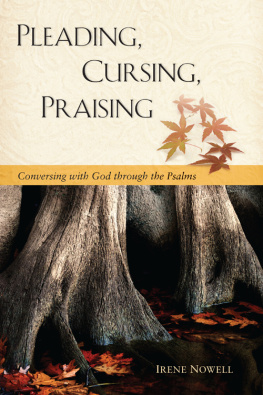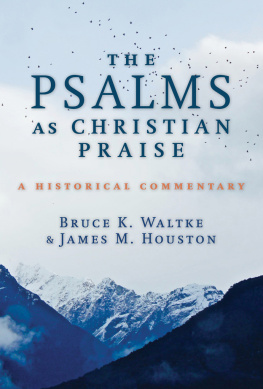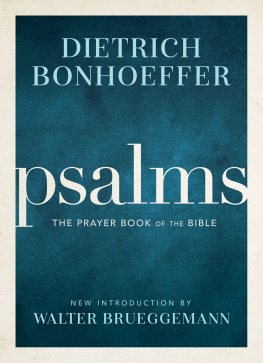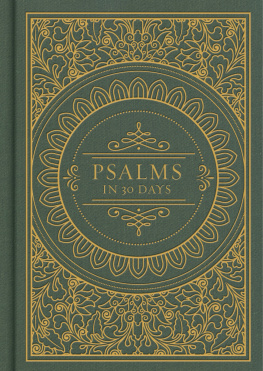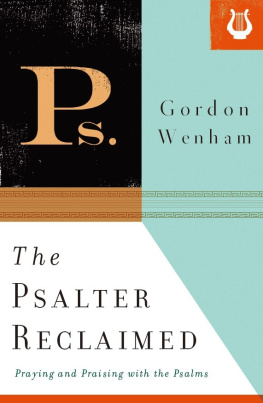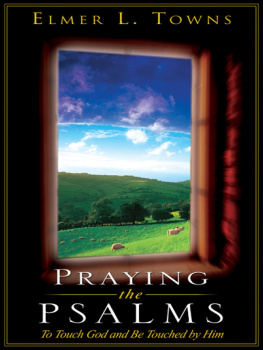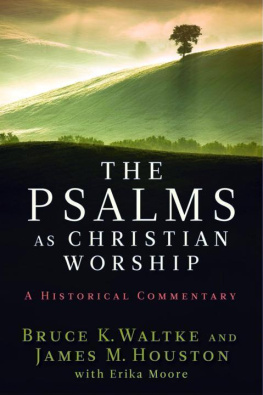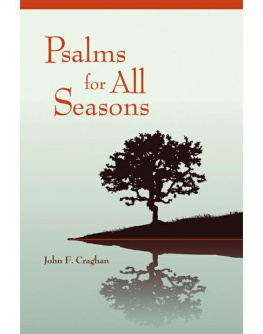Pleading, Cursing, Praising
Pleading, Cursing, Praising
Conversing with God through the Psalms
Irene Nowell, OSB

LITURGICAL PRESS
Collegeville, Minnesota
www.litpress.org
Cover design by Jodi Hendrickson. Cover images: Thinkstock.
Excerpts from the English translation of Liturgical Psalter: A Text for Study and Comment 1994, International Commission on English in the Liturgy Corporation (ICEL); excerpts from the English translation of The Roman Missal 2010, ICEL. All rights reserved.
Unless otherwise noted, scripture texts in this work are taken from the New Revised Standard Version Bible 1989, Division of Christian Education of the National Council of the Churches of Christ in the United States of America. Used by permission. All rights reserved.
2013 by Order of Saint Benedict, Collegeville, Minnesota. All rights reserved. No part of this book may be reproduced in any form, by print, microfilm, microfiche, mechanical recording, photocopying, translation, or by any other means, known or yet unknown, for any purpose except brief quotations in reviews, without the previous written permission of Liturgical Press, Saint Johns Abbey, PO Box 7500, Collegeville, Minnesota 56321-7500. Printed in the United States of America.
The Library of Congress has cataloged the printed edition as follows:
Library of Congress Cataloging-in-Publication Data
Nowell, Irene, 1940
Pleading, cursing, praising : conversing with god through the psalms/Irene Nowell.
p. cm.
Includes bibliographical references.
ISBN 978-0-8146-3517-9 ISBN 978-0-8146-3542-1 (e-book)
1. Bible. O.T. PsalmsPrayers. I. Title.
BS1430.55.N69 2013
223.206dc23 | 2012042298 |
For Daniel Durken, OSB,
who first encouraged me
to write about the Psalms.
Preface
I have lived with the Psalms most of my life. My monastic community prays them daily, and throughout the course of four weeks we pray the entire Psalter. My educational journey has also taken me to the Psalms. My undergraduate degree is in music, but after college I took a detour to study languages, particularly German. Finally I found my true love: Scripture. That somewhat disorganized journey led me inevitably to the Psalms. Where else can you find a subject that includes singing, language, and Bible?
My aim in writing this book is to encourage you not only to use the Psalms as your prayerbook but also to use them as models for additional personal prayer. I am convinced that the Psalms teach us to pray. I suggest that, as you read this book, you keep a Psalm book handy to ponder other psalms that teach us to tell our story, cry out our pain, and give praise to God. (At the end of the book is a table listing laments, thanksgiving psalms, hymns, etc.) In addition, I encourage you to write your own psalm-prayers. I have added exercises to the end of several chapters as an aid for this endeavor.
As you read this book, you will see signs of its long gestation. It originated with a few talks given to the chapter of the Federation of St. Scholastica. The talks then grew into a retreat that I enjoyed sharing with many communities across the country. Along the way some of the material also appeared in print. Now I am responding gratefully to the suggestion of Father Daniel Durken, OSB, to turn the spoken word into the book that you have in your hands.
It is impossible for me to list all the people to whom I am grateful for having shaped the material in this book. I thank Abbot Gregory Polan, OSB, of Conception Abbey, my lifelong friend, for his excellent translation of the Psalms in the Revised Grail Psalter. He is a worthy follower of his insightful patron, Gregory the Great. I thank Michael Boschert at GIA for permission to quote Abbot Gregorys translation. I am grateful to Father Michael Casey, OCSO, for permission to print material from my article that appeared in Tjurunga. To all my friends at Liturgical Press, too many to be named, I say, Thank you! Your encouragement has been a great gift to me. Finally, I am deeply grateful to my wonderful community at Mount St. Scholastica. What I know about praying the Psalms I learned from my sisters.
Irene Nowell, OSB
1
Begin at the Beginning:
If you would be happy (Ps 1)
W hen I was a sophomore in high school, my English teacher used to quote the psalms to us all the time. She frequently said, Its so good to be a Benedictine. The psalms just soak into your bones. I entered monastic life for a lot of the wrong reasonsor reasons I did not knowbut one of the right reasons was because I wanted the psalms to soak into my bones. Gradually I came to realize that, even here, Sister Lillian Muell was quoting the psalms. Psalm 1 tells us that if we ponder the law of the Lord day and night, we will be like trees planted by a flowing stream. The Psalter (the book of Psalms) is a distillation of Gods law. So the law of the Lord, the Word of God in the psalms we pray day by day, will soak into our bones, refreshing and nourishing us, giving us life.
What does it mean that the psalms will soak into our bones? What kind of people will we become if we pray the psalms regularly, daily? Demetrius Dumm uses the image of a Crock-Pot, which tenderizes even the toughest cuts of meat. He observes that many a tough-willed monastic has been made docile and gentle before God by faithful praying of the psalms. The psalms are a gift for all of us, whether we are professed religious or faithful laypeople.
The introduction to any book tells us many things: the purpose of the author, the authors style, the basic content, and, perhaps, the organization of the book. So what is the introduction to the Psalter? Let us use our skills in lectio divina (slow, thoughtful reading) to ponder Psalm 1. What can this introductory psalm tell us about why we pray the Psalms and what their effect on us will be?
We begin with happiness. The first word of the Psalter is happy, in Hebrew, ashre. From its first word this little book of 150 song-prayers promises to tell us how to be happytruly, deeply happy. But the psalm does not begin with a recipe for happiness. Rather it begins by telling us what to avoid: never walk with the wicked, / never stand with sinners, / never sit among cynics. This psalm shows us that happiness is clearly a communal virtue! If we associate with the wicked, sinners, and cynics, we will become like them. The first verse of the Psalter implies that these people are not happy!
Who are these people we are advised to avoid? The first two termswicked and sinnersare generic. But the third termin Hebrew, letsim , meaning cynics or scoffersis more specific. The people we are warned to avoid if we want to be happy are not named as murderers or adulterers, embezzlers or muggers. They are the naysayers among us. These are people like Jobs friends who scorn him and attempt to convince him that he is a sinner (see Job 16:20). According to Proverbs, they are proud and haughty and act with arrogance (Prov 21:24). These people have closed all the doors and are unable to be open to anything new that God might have to offer. Do you know any of these people? Have you ever met someone who always knows better than those in authority? Or who is wiser than the wisdom of the whole group and lies in wait for a community or family decision to fail? Saint Benedict calls these people murmurers or grumblers, and he is insistent that this danger be rooted out; Above all else we admonish them to refrain from grumbling (RB 40.9).
The progression of verbs in these first verses of Psalm 1 is also significant: walk, stand, sit. Psalm 1, the introduction to the Psalter, warns us that if we would be happy we should avoid getting drawn into a murmuring session: first strolling along, then standing in doorways or on street corners, and finally sitting down with a cup of coffee, grousing away. If you would be happy, dont do this!

